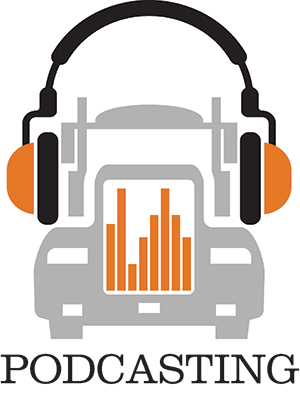The Power of Podcasting
[Stay on top of transportation news: Get TTNews in your inbox.]
Amidst the wide array of highly sophisticated digital tools marketers are using to increase profits, a surprising — and decidedly low-tech — alternative is scoring big gains for trucking companies: the simple podcast. Essentially a recorded spinoff of an old-timey radio show that features a host and maybe a guest or two talking on a microphone, podcasts are the current “next big thing” on the web, drawing millions of listeners.
“Podcasting is an unbelievable recruiting tool,” said Steve Aborn, partner at Aborn & Co., which offers a logistics podcast. “A few years ago, we were recruiting at an MIT Transportation & Logistics Center event, and several of the recruits we spoke to were aware of our company solely because of the podcast. As a small, growing company that’s trying to hire top talent, that was super powerful.”
Brian Everett, CEO of the Transportation Marketing & Sales Association, is another believer in the medium.

Dysart
“I know of several transportation and logistics companies that are leveraging podcasting as an effective channel to reach their workforce — including professional drivers,” he said. “Podcasting has been used effectively in driver relations and engagement because they tend to be independent, resourceful individuals who are seeking ways to be informed about life on the road and how to be more productive as they drive down the road.”
Jamie Spencer, owner of MakeAWebsiteHub.com, added: “It’s a great way to grow your business, connect with other leaders in your space, deepen your relationship with your audience and much more.”
Marketers have all sorts of theories about podcasting’s rabid popularity. The shows are eminently portable: You can take them with you to the market, to the gym, on a walk or in an elevator. And podcasts are eminently personal: While you’re listening to a podcast, you can completely tune out the rest of the world. It’s just you and your favorite podcast host inside your headphones.
Moreover, in trucking, the medium is perfectly suited to the trucker lifestyle.
“With drivers on the road for long hours, the ability to download specific episodes allows a driver to create a custom playlist of topics of interest to them,” said Bruce Outridge, host of The Lead Pedal Podcast for Truck Drivers.

More Q2 iTECH stories
No matter what underlying factors are propelling podcasting, the fact remains, it’s a medium on fire. There are 86 million podcast listeners in the U.S. alone — a number expected to grow to 132 million by 2022, according to Statista.
Perhaps most telling is that big money has moved into podcasting. Last year, online music service Spotify announced it had allocated $500 million for podcasting, which it planned to use for scooping up ownership of podcasts it believes promise the greatest returns.
Landstar is one of a number of trucking and logistics companies that have scored major gains with a podcast, according to Rocco Davanzo, an executive vice president at the company.
Landstar’s show focuses on championing the entrepreneurial spirit and sharing industry knowledge.
“Landstar sees podcasting as an effective way to connect with prospective recruits — whether they are independent owner-operators or freight agents,” Davanzo said. “It’s also a way to further engage with the over 9,500 owner-operators leased to Landstar — to keep them connected in an entertaining way.”
Troy Austin, host of TalkCDL Trucking Podcast, offers every aspect of trucking culture on his show, including stories from the road, small business advice, news on trucking shows and interviews with industry leaders.
“If you have a loyal listener base that trusts you, then it is very effective,” Austin said.
His show often features trucking companies that run recruitment ads. “That’s why we like to make sure the carriers we have on the show are good carriers for the drivers.”
Moreover, having actual truckers on the show — via on-air interviews or by responding to emails and suggestions on air — also helps make the show a true companion for the road, Austin said.
“You can really create a great bond and relationships as you go along,” using ongoing listener involvement, Austin said.

Jane Jazraway, co-host of the CarriersEdge Podcast, leverages her show to promote her company’s online truck driver training system.
“The podcast started about three years ago and is an ongoing discussion of driver training, HR issues and technology,” Jazraway said. “We were originally thinking that our audience would be our corporate industry partners and resellers who like to know what we’re working on in terms of new course content and features for our learning management system.”
But that audience has expanded to include customers of the CarriersEdge online training system, as well as companies involved in Best Fleets — a CarriersEdge website that offers a curated view of the best workplaces for North American truck drivers, Jazraway said.
“The most surprising audience we have are job applicants,” Jazraway added. “In retrospect, listening in on the executive team’s conversation is a great way to get a sense of the company’s culture — so I would recommend it highly as a way to differentiate yourself.”
Kyle MacNaught, director of marketing at Aborn & Co., focuses on his company’s primary business — logistics — with his podcast, Consulting Logistics.
“We interview subject matter experts on a wide variety of topics in the supply chain — from capacity, to setting up an EDI connection with carriers,” MacNaught said.
“We also enjoy capturing the personal side of transportation,” he added. “We believe the medium does a great job of bringing the human side of the job to life by providing a voice someone can hear and connect with.”
The good news for trucking businesses — both big and small — is that virtually anyone can ride the podcasting wave. Granted, your company’s podcast may not become one of the top 100 podcasts in the U.S. overnight, but any trucking business that takes the time to put together a quality production that’s promoted professionally stands to benefit from the intense interest in podcasting.
Here’s a plan for getting started:
- Take advantage of inexpensive podcasting tech: Fortunately, getting started in podcasting involves extremely minimal investment. You can pick up a completely acceptable microphone, filter and headset for recording your show for about $100 on Amazon. Plus, you can use freeware like Audacity to record and edit your podcast on a computer.
- Consider using a special hosting service to host your podcast on the web: While you may be able to get away with hosting your podcast on an everyday website, you’ll probably have better luck hosting your production with web hosts that specialize in podcast hosting. The reason: Podcast files are generally much larger than text and images files. Consequently, podcast hosts generally offer the higher bandwidth you’ll need to enable listeners to quickly and easily download and listen to your shows. Popular podcast hosting companies include Soundcloud, Podbean, Podomatic, Lybsyn and Fireside.
- Clearly communicate the focus of your podcast: There are already tens of thousands of popular podcasts out there. So you’ll want to take pains to clearly communicate with listeners about your podcast’s focus — and how it will differ from competitors.
- Get a jump on long-term guest scheduling: Given that many podcasts rely on guest interviews to keep things fresh, you’ll want to get commitments from at least a dozen or more guests you’ll be interviewing for your show — even before your first show airs.
- Establish a deep backlog of “rainy day” shows: Before you go live with your podcast, you’ll also want at least six, fully produced shows in the hopper — just in case something goes wrong. Guests canceling at the last minute, technology that acts up, unexpected developments in your personal life — all of these and more can wreak havoc on podcast scheduling if you’re not prepared.
- Get your work copyrighted: Like so many other things digital, stealing someone’s podcast is as easy as highlighting a podcast file and clicking “copy.” Fortunately, Creative Commons offers a free, in-depth guide on how to guard against such theft and copyright your show.
- Promote by publishing your podcast transcripts on your website: Your podcasting site will appear higher up in Google search returns — and get more exposure for your podcast — if you publish a word-for-word transcript of your podcast. The reason: Google will zoom in on the keywords in your transcripts that mirror keywords used by people searching for your type of content and send some of those people your way.
- Promote by submitting your podcast to Apple Podcasts and other directories: By creating an account, you’ll be able to post your podcast and enable it to be searchable by everyone who uses the service.
- Consider reading ads for your sponsors: As your podcast grows more popular, you may be able to sell advertising time on your show. Some podcasters opt to read those ads themselves, given that they’ve established an audience that tunes in regularly and they have a natural bond with that audience. But others shy away from endorsing products, fearing that close associations with sponsors might compromise their objectivity.
Joe Dysart is an Internet speaker and business consultant based in Manhattan. Voice: (631) 438-1142. Email: joe@dysartnewsfeatures.com.
Want more news? Listen to today's daily briefing:




